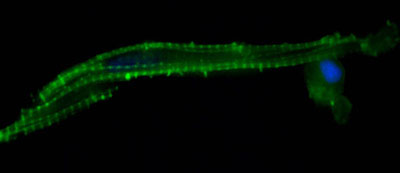Axis 1: Physiological and behavioural performances of animals in response to environmental variations
Axis 1 works are about the study of physiological and behavioural responses at different organization levels (molecule, cell, organ, individual, population). In this context, some physiological functions of interest – immunity function, detoxification, breathing and filtration, cardiac function, energetic metabolism and locomotion – are favoured in order to better understand the mechanisms of their functioning, or the dysfunction toward environmental factors such as temperature, hypoxia, nutritional quality, acidification, or chemical contaminants. More precisely, we focus our works on the study of physiological processes having an ecological pertinence, via cellular physiology, biochemistry & functional genomics approaches, and individual approaches: behaviour, breathing, locomotion, growth.

These questions are constantly put back in an environmental context, taking account of the importance of abiotic (temperature), biotic (ontogenetic stage) and ecologic (spatio-temporal variations, change of ecosystem structure and trophic functioning) factors.
The aim of these works is multiple and tries to lead to:
- The identification of causal relations between environmental forcing, biological mechanisms and individual performances
- The understanding of the implications of physiological mechanisms in ecological processes
- The definition of the thresholds of organisms’ sensitivity toward environmental pressures
- The definition of tolerance range in which occurs the physiologic functions necessary to maintain the organism’s fitness

Some current projects:
- Project Port de Plaisance La Rochelle: Improvement of environment quality (interannual follow-up) (2015-2018)
- Project NITOXMOR: pseudo-nitzschia: toxicity or mortality? (2018)
- Project PECTIMPACT (MAE/ Royal Norwegian Embassy): Multidisciplinary approach to PECTinidae Chlamys sp: IMPACT of a chemical contamination (2016-2019).
- Project ECONAT (FEDER/CPER): port dynamics, urban environments and maritime environment DYPOMAR (2015-2020).
Participants of the axis:
- Permanent staff: Anne Aubert ; Imbert Nathalie ; Lefrançois Christel ; Murillo Laurence ; Rosenfeld Eric ; Isabelle Goubet ; Thomas Helene ; Vagner Marie
- CDD: N Ouillon (IE)
- PhD students: Breitwieser Marine
- Platforms: Ecophysiology, Aquarium, Swamp, Molecular Biology, Imaging Cytometry, High resolution analysis of biomolecules, Elementaries analysis



